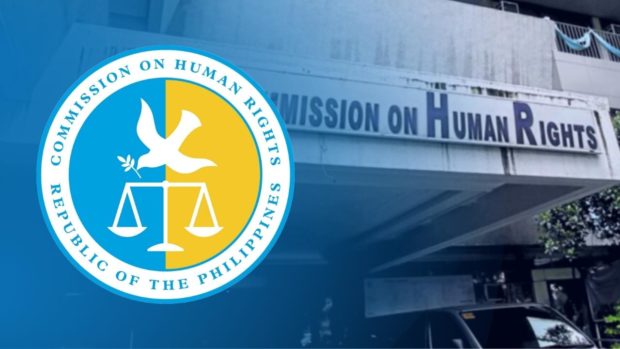CHR: Marcos gov’t ‘open’ to human rights issues

Commission on Human Rights INQUIRER FILE PHOTO
While the country’s human rights situation remains far from ideal, the Commission on Human Rights (CHR) is cautiously optimistic about the Marcos administration’s “openness” to listen to and engage with the agency.
During a recent year-ender session with the media, CHR Chair Richard Palpal-latoc said he and the other commissioners have noted a marked improvement in the government’s treatment of human rights issues since their appointment in September 2022.
“The government is open to engaging with the CHR. [Generally] it was OK, and I think the United Nations Joint Program [on Human Rights] really helped in our engagements with the government,” he also said, referring to the international body’s program to help mitigate rights abuses in the country.
Palpal-latoc cited further the CHR’s partnerships with other government agencies like the Bureau of Corrections, Bureau of Jail Management and Penology, and Civil Service Commission, all with the goal of improving and promoting rights awareness among their personnel.
In addition, the CHR is “constantly invited by the Senate and the House of Representatives [during deliberations on] different bills that have a human rights component,” he said.
Sen. Lito Lapid had earlier filed Senate Bill No. 2487, or the “Act strengthening the CHR as a National Human Rights Institution (NHRI) and for other purposes,” which, if passed, would grant it “full authority” to act on all cases of human rights violations.”
The bill also allows the agency to issue injunctive reliefs and legal measures—powers that its officials have sought since their appointment.
“We are hoping and expecting that it would be approved soon,” Palpal-latoc said. “It’s still up to the House and the Senate to deliver but hopefully, it seems its chances [of being passed] seem good.”
Stance on ICC
The CHR noted as well the change in the President’s stance regarding the International Criminal Court (ICC), which is conducting an investigation into the extrajudicial killings (EJKs) committed under former President Rodrigo Duterte as well as those carried out by the Davao Death Squad when he served as Davao City mayor from 2011 to 2016.
From questioning the ICC’s authority to carry on with its probe, Mr. Marcos said last month that the government was studying returning to the fold of the court.
This is “consistent with our stance ever since that the government should participate in the ICC probe and rejoin the Rome Statute,” Palpal-latoc said.
Duterte ordered the country to withdraw its membership in the Rome Statute, the ICC’s founding document, in March 2018, weeks after the ICC prosecutor’s office launched an initial inquiry into alleged EJK cases in the country.
Commission not yet complete
During the former president’s term, he openly vilified the CHR, prompting his allies in Congress in 2017 to threaten to reduce the agency’s budget to just P1,000 for daring to investigate the drug war killings.
Despite the improved relationship between the government and the agency that was established after the President’s father and namesake was ousted from power in 1986, rights groups are far from satisfied.
They noted that activists and journalists continue to be killed, arrested, or forced to disappear as they accused Mr. Marcos of merely pretending to be more lenient than his dictator-father.
“As of now, we still have no engagement with the DOJ (Department of Justice). We’ve followed it up with the Presidential Human Rights Committee Secretariat,” Palpal-latoc said.
The CHR also lacks one more member for the five-member commission to be completed. It is currently composed of Palpal-latoc, former Ombudsman official Beda Epres, former National Nutrition Council official Faydah Dumarpa, and retired Court of Appeals Justice Monina Zenarosa.
Furthermore, the CHR has yet to become a member of the DOJ review panel on the drug war killings, which the government presented as proof that there was no need for an ICC investigation since there was already an ongoing probe.
Palpal-latoc, however, was hopeful the CHR would finally be “actively engaging [with the DOJ panel by next year.”
Building on gains
For 2024, the CHR hopes to build on its gains from the past year and continue its engagements with other agencies.
“Already in the pipeline are partnerships with the Department of Migrant Workers and the Professional Regulation Commission, as well as other [national human rights institutions],” Palpal-latoc said.
Next year, the agency is also batting for a memorandum of agreement with the Presidential Task Force on Media Security, “specifically for case referrals, especially in cases of abuses against journalists, investigation of cases, and (offering) financial assistance for human rights violations,” he added.
READ: CHR: ICC decision a chance for Marcos to prove vows of accountability